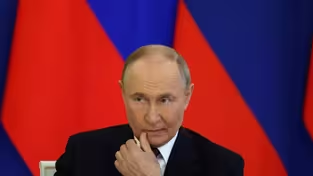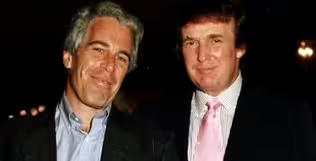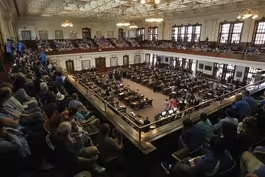
FCC’s Carr says network oversight a needed course correction
Clip: 7/31/2025 | 9m 40sVideo has Closed Captions
FCC chairman says network oversight offers a needed ‘course correction’
We continue our look at the FCC’s decision to allow Paramount, the parent company of CBS, to merge with the Hollywood studio Skydance. The scrutinized media deal was approved in a 2-1 vote after Paramount agreed to a settlement with President Trump and Skydance agreed to other concessions. Geoff Bennett discussed more with FCC Chairman Brendan Carr, who voted in favor of the merger.
Problems playing video? | Closed Captioning Feedback
Problems playing video? | Closed Captioning Feedback
Major corporate funding for the PBS News Hour is provided by BDO, BNSF, Consumer Cellular, American Cruise Lines, and Raymond James. Funding for the PBS NewsHour Weekend is provided by...

FCC’s Carr says network oversight a needed course correction
Clip: 7/31/2025 | 9m 40sVideo has Closed Captions
We continue our look at the FCC’s decision to allow Paramount, the parent company of CBS, to merge with the Hollywood studio Skydance. The scrutinized media deal was approved in a 2-1 vote after Paramount agreed to a settlement with President Trump and Skydance agreed to other concessions. Geoff Bennett discussed more with FCC Chairman Brendan Carr, who voted in favor of the merger.
Problems playing video? | Closed Captioning Feedback
How to Watch PBS News Hour
PBS News Hour is available to stream on pbs.org and the free PBS App, available on iPhone, Apple TV, Android TV, Android smartphones, Amazon Fire TV, Amazon Fire Tablet, Roku, Samsung Smart TV, and Vizio.
Providing Support for PBS.org
Learn Moreabout PBS online sponsorshipGEOFF BENNETT: We're taking a closer look now at the FCC's decision to allow Paramount, the parent company of CBS, to merge with the Hollywood studio Skydance.
It's one of the most scrutinized media deals in recent history approved in a 2-1 vote by the FCC after Paramount agreed to a $16 million settlement with President Trump over a "60 Minutes" interview with former Vice President Kamala Harris and after Skydance agreed to install an independent monitor to review alleged bias at CBS, among other concessions.
Earlier this week, we spoke with FCC Commissioner Anna Gomez, who opposed the deal and raised serious concerns about its impact on First Amendment rights and press freedom.
Tonight, we're joined by FCC Chairman Brendan Carr, who voted in favor of the merger.
Mr. Chairman, welcome to the "News Hour."
BRENDAN CARR, Commissioner, Federal Communications Commission: Yes, great to be with you.
Thanks for having me on.
GEOFF BENNETT: You have said this merger will help restore fair, fact-based reporting and ultimately serve the public interest.
How does this deal meet that standard?
And what criteria did the FCC use to assess it?
BRENDAN CARR: Yes, I'm really proud of the FCC's work on this.
Our staff worked incredibly hard.
I think it's ultimately a really good win for the American people.
If you step back right now, there's sort of overall a really significant trend towards lack of trust in the media.
And that trend hasn't been a new one over the last couple of years.
It goes back all of the 1970s.
We have seen a pretty significant decline.
One thing that CBS has agreed to do as part of this transaction is to bring more fact-based, objective, unbiased coverage to their newsrooms.
I think it's a really good win for the American people.
One thing they said they were going to do in particular was to embrace a diversity of viewpoints across the political and ideological spectrum, so not just bringing one side of the political debate to the table, but making sure that all views are aired.
And I think that's a good thing for American people, because, when you look out there, I think too often we see news coverage that's merely sheepdogging people towards preferred political narratives one way or the other.
So having an entity out there committing to diversity of viewpoints, I think it's a really good win for the public.
GEOFF BENNETT: On the matter of this idea that there's bias in legacy media, should government regulators play a role in correcting that perceived bias?
Isn't that the job of the audience or the free market, not the FCC, not the federal government?
BRENDAN CARR: There's a couple of different types of outlets that are out there, and the FCC's role is different with respect to all of them.
So, for instance, to your point, when it comes to podcast or streamers, the FCC doesn't really regulate them.
So they're subject entirely to market forces.
On the other hand when it comes to legacy broadcasters like CBS, like PBS, they're licensed by the FCC to operate and they're licensed because the airwaves are a scarce national resource.
When we license you or license a CBS station, we're necessarily denying another outlet the ability to use those airwaves.
As a condition of that, broadcasters are unique.
They have a public interest obligation.
I think, for years, the FCC has walked away from enforcing that public interest mandate.
And I don't think we're better off for it.
Again, if you just step back and look at trust in mainstream outlets, like Gallup survey shows that it's at an all-time low, increasingly below even the levels of trust that people have in Congress.
So I do think it's an important role for Congress as a sign to the FCC to make sure that broadcasters meet their public interest obligations.
And that's what we're trying to do.
GEOFF BENNETT: With this so-called bias monitor at CBS, if CBS News produces a hard-hitting piece about President Trump, could that story then be subject to review or complaint under this new framework?
Who ultimately decides what counts as bias?
BRENDAN CARR: In the first instance, this will be up to the company itself.
This bias monitor is someone that they're hiring inside CBS.
They're going to report directly to the president of CBS itself.
And I think the model there is very similar to what we see in newspapers, right?
So, for years, newspapers have had a public editor, for instance.
It's also not unprecedented for the FCC back a couple of years ago, during a Democrat administration, when Comcast was doing a deal, NBC, they agreed to put some sort of ombudsman in place as well to address things like journalistic independence.
So this concept is fairly well-established.
And, again, it's going to be for the broadcaster in the first instance to deal with it.
If there's a complaint around news distortion, which the FCC does have rules on, again, on broadcast, not cable, then we would look at that complaint as it comes in.
But, hopefully, the course-correction here happens inside the company.
GEOFF BENNETT: With that NBC-GE precedent you mentioned, in that case, the ombudsman protected the NBC newsroom from ownership interference by GE.
Here, Skydance is agreeing to government-endorsed oversight or review of news content.
And that raises the question, doesn't this run afoul of press freedom?
BRENDAN CARR: No, not at all.
Again, I think, in both cases, the NBC precedent and the one here, the government is signing off on the concept of the company having an ombudsman.
And to the extent that their job is to make sure that there's balance in the newsroom, balanced news, I think it's good that they have it.
Again, it's not direct regulation by the FCC in terms of regulation of the newsroom itself.
It's the company saying, we want to put forth an ombudsman to help us do our job.
And, again, on the broadcast side, these are entities that have an obligation to promote the public interest.
And I think it can be a good thing.
We need to have some sort of change.
The general trajectory of the American people simply not trusting these news outlets, I don't think it's a good thing or a healthy thing for the country.
But one other thing that they committed to was empowering local stations.
So, remember, most people don't realize this.
You do obviously in the industry.
But you can think about the media space at two levels.
On the one hand, you have the national programmer itself.
That's CBS, NBC.
But then you have the actual local TV station that's licensed by the FCC.
And what's happened over the years is that national programmers, NPR, PBS, have exerted, in my view, more and more control over the operations of those local TV stations.
I don't think that's a good thing.
So, again, there was a commitment here made by CBS to empower those local TV stations.
I think we're going to be better off for that as well.
GEOFF BENNETT: You're making the point that these concessions were offered voluntarily by Skydance and by Paramount.
How voluntary can they be when the price was effectively government approval and when so many of the concessions so clearly align with President Trump's political interests, like scrapping DEI policies and the like?
BRENDAN CARR: Again, this was very common, normal practice at the FCC.
So, for instance, during the last administration, there was a transaction before where a company came in and made commitments in the record to advance DEI initiatives.
And those were accepted by the FCC in its decisional document.
Here, we're doing the same type of the thing, but moving in the opposite direction, which is, there's versions of DEI, not all DEI, but there's versions of DEI that amount to invidious forms of discrimination.
And the FCC has long had rules on our books, EEO regulations, that prohibit broadcasters and others from engaging in those forms of discrimination.
And so the commitments made here by CBS was to get rid of any of those invidious forms of discrimination.
And I think overall that's a good thing and, again, sort of consistent with our authority to make sure that we have nondiscrimination across regulated entities.
GEOFF BENNETT: President Trump suggested in a social media post last week that you should consider revoking the licenses of ABC and NBC because he considers them too partisan, in his words, too Democrat.
Is that something that you're considering?
BRENDAN CARR: Well, look, again, I think we need to have some sort of course-correction as a general matter here.
And if you step back, I think one of the things that President Trump did, particularly when he ran for election, was he ran at a lot of these legacy national news meeting that, again, a lot of the American public don't trust.
And he is empowering people to have more choices across different sources of news and information.
Again, it's a much more competitive environment right now, whether you have podcasts or online or streaming.
It used to be that you (AUDIO GAP) news from one of the three broadcasters back in the day.
I think, again, with more choice, with more competition, that's a good thing.
And, again, this idea that broadcasters are this sort of gatekeeper and they have to be trusted by everybody, that used to be the way that people viewed it, but it's different now.
I think it's a good thing that people have choice.
And, of course, on the broadcast side, if you have a license by the FCC, if you're not complying with your public interest obligations, then license revocation is always a penalty that's possible.
GEOFF BENNETT: When President Trump made similar threats during his first term, the then-FCC chairman, Ajit Pai, said: "I believe in the First Amendment, and under the law, the FCC does not have the authority to revoke a license of a broadcast station based on the content of a particular newscast."
What's changed?
BRENDAN CARR: Well, that was a statement by Chairman Pai, not a statement by me, but, among other things, that statement was very narrow, if you read it.
It was the content of a particular broadcast.
But, again, if we are seeing broadcasters that are engaged in patterns and practices that ultimately are inconsistent with their public interest obligation, then Congress has directed the FCC to take action in those contexts.
Again, I don't think it's benefited the American people to have the FCC step back from enforcing the public interest mandate.
And so I think that's something that we're going to do.
It's something that Congress wants us to do.
If the American people don't want that, then they're free to go to lobby Congress to change the law.
But up to now, there is a public interest obligation.
And it's our responsibility to enforce it.
GEOFF BENNETT: FCC Chairman Brendan Carr, thanks again for joining us this evening.
We appreciate it.
BRENDAN CARR: Yes, good to be with you.
Thanks.
Economist analyzes Trump's tariff policy deadline approaches
Video has Closed Captions
Clip: 7/31/2025 | 6m 32s | Economist analyzes Trump's trade deals as tariff deadline approaches (6m 32s)
Ex‑CIA analyst slams Trump’s effort to deny Russia probe
Video has Closed Captions
Clip: 7/31/2025 | 11m 45s | Ex-CIA analyst challenges Trump's attempt to discredit Russian election interference probe (11m 45s)
How Trump's answers about fallout with Epstein have evolved
Video has Closed Captions
Clip: 7/31/2025 | 6m 26s | How Trump's answers about his fallout with Epstein have evolved (6m 26s)
News Wrap: White House sending officials to inspect Gaza aid
Video has Closed Captions
Clip: 7/31/2025 | 4m 56s | News Wrap: White House sending 2 officials to inspect Gaza food distribution (4m 56s)
Shaheen on vote to block Israeli arms: Things need to change
Video has Closed Captions
Clip: 7/31/2025 | 6m 35s | Sen. Shaheen on why more Dems voted to block weapons to Israel: 'Things need to change' (6m 35s)
The Texas redistricting battle and its midterm impact
Video has Closed Captions
Clip: 7/31/2025 | 5m 23s | The Texas redistricting battle and its impact on next year’s midterms (5m 23s)
Providing Support for PBS.org
Learn Moreabout PBS online sponsorshipSupport for PBS provided by:
Major corporate funding for the PBS News Hour is provided by BDO, BNSF, Consumer Cellular, American Cruise Lines, and Raymond James. Funding for the PBS NewsHour Weekend is provided by...

















